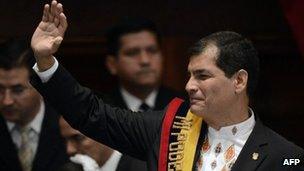Ecuador MPs approve media curbs
- Published

Ecuador's National Assembly has passed a controversial bill creating a media watchdog and redistributing radio and television frequencies.
The bill is set to limit the number of private broadcasters, which currently account for the majority of the media.
Opposition leaders called it a "gagging law", but the government said it would prevent media abuse and monopolisation.
President Rafael Correa has had a number of rows with journalists and is accused of trying to control the press.
The bill creates a supervising body charged with "surveillance, auditing, intervention and control" and with "sanctioning capacity" over newspapers and broadcasters.
Ecuador's politicians have been debating the media law for more than three years.
But the vote on the law, although widely discussed, had been left pending by the last legislature.
The new assembly, controlled by Mr Correa's Alianza Pais party, which won nearly three-quarters of the 137 seats at February elections, approved it with an overwhelming majority.
'Death certificate'
The bill will see radio and television frequencies revised so that a third of broadcast frequencies are reserved for state media, a third for private broadcasters and a third for community groups, which are mostly indigenous.
The government says this is in order to promote the "socialisation and democratisation" of media.
Meanwhile, the bill calls for the punishment with fines or mandatory public apologies of media outlets considered guilty of "media lynching", defined as concerted and repetitive defamation of individuals or companies.
Government supporters say the reforms would make communications more democratic, giving a stronger voice to different groups.
"[We say] never again to monopoly, the concentration of media in the hands of the few," Assembly speaker Mauro Andino told website El Comercio, praising the "equitable" distribution of frequencies.
But opposition figures say the bill is an attempt to neutralise independent broadcasters.
They say Mr Correa is cracking down on freedom of expression.
"Today the death certificate of freedom of expression has been signed," tweeted opposition assembly member Andres Paez.
"We are on the way to consolidating a fascist regime."
Mr Correa, 50, stands accused of implementing policies that have served to strengthen his hold on power and erode the influence of political opponents and private media.
But his so-called citizens' revolution has made him popular with many ordinary Ecuadoreans, while winning him friends among other Latin American left-wing leaders.
Mr Correa, a US-trained economist, took office in 2007 and was recently re-elected for an unprecedented third term.
- Published2 February 2012
- Published27 February 2013
- Published18 February 2013
- Published15 January